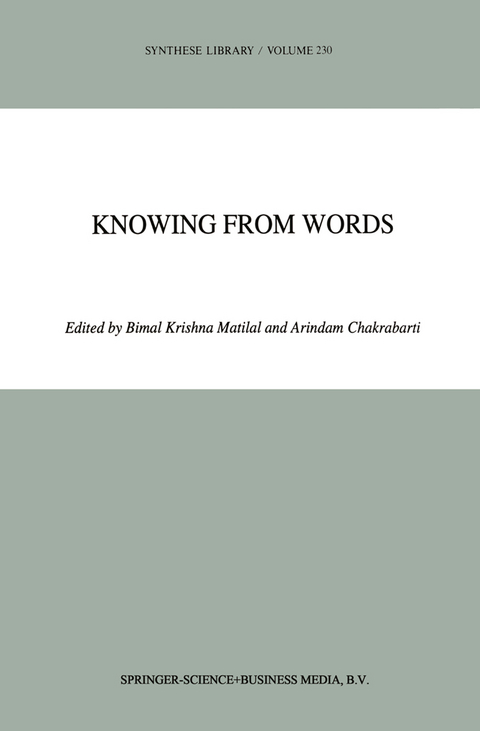
Knowing from Words
Western and Indian Philosophical Analysis of Understanding and Testimony
Seiten
1993
Springer (Verlag)
978-0-7923-2345-7 (ISBN)
Springer (Verlag)
978-0-7923-2345-7 (ISBN)
Translating from Sanskrit some contemporary Indian Pandits' reactions to Western analytic accounts of meaning and knowledge, this title is suitable for advanced undergraduates in philosophy, for researchers - in Australia, Asia, Europe or America - on epistemology, theory of meaning, and, Indian or comparative philosophy.
Never before, in any anthology, have contemporary epistemologists and philosophers of language come together to address the single most neglected important issue at the confluence of these two branches of philosophy, namely: Can we know facts from reliable reports? Besides Hume's subversive discussion of miracles and the literature thereon, testimony has been bypassed by most Western philosophers; whereas in classical Indian (Pramana) theories of evidence and knowledge philosophical debates have raged for centuries about the status of word-generated knowledge.
`Is the response "I was told by an expert on the subject" as respectable as "I saw" or "I inferred" in answer to "How do you know?"' is a question answered in diverse and subtle ways by Buddhists, Vaisesikas and Naiyayikas. For the first time this book makes available the riches of those debates, translating from Sanskrit some contemporary Indian Pandits' reactions to Western analytic accounts of meaning and knowledge.
For advanced undergraduates in philosophy, for researchers - in Australia, Asia, Europe or America - on epistemology, theory of meaning, Indian or comparative philosophy, as well as for specialists interested in this relatively fresh topic of knowledge transmission and epistemic dependence this book will be a feast.
After its publication analytic philosophy and Indian philosophy will have no excuse for shunning each other.
Never before, in any anthology, have contemporary epistemologists and philosophers of language come together to address the single most neglected important issue at the confluence of these two branches of philosophy, namely: Can we know facts from reliable reports? Besides Hume's subversive discussion of miracles and the literature thereon, testimony has been bypassed by most Western philosophers; whereas in classical Indian (Pramana) theories of evidence and knowledge philosophical debates have raged for centuries about the status of word-generated knowledge.
`Is the response "I was told by an expert on the subject" as respectable as "I saw" or "I inferred" in answer to "How do you know?"' is a question answered in diverse and subtle ways by Buddhists, Vaisesikas and Naiyayikas. For the first time this book makes available the riches of those debates, translating from Sanskrit some contemporary Indian Pandits' reactions to Western analytic accounts of meaning and knowledge.
For advanced undergraduates in philosophy, for researchers - in Australia, Asia, Europe or America - on epistemology, theory of meaning, Indian or comparative philosophy, as well as for specialists interested in this relatively fresh topic of knowledge transmission and epistemic dependence this book will be a feast.
After its publication analytic philosophy and Indian philosophy will have no excuse for shunning each other.
Table of Content.- Knowing From Words.- Is There an Irreducible Mode of Word-Generated Knowledge?.- Testimony, Justification and Coherence.- Testimony and Coherence.- Epistemology of Testimony and Authority: Some Indian Themes and Theories.- Telling as Letting Know.- Against Gullibility.- The Role of Comprehension.- Knowledge by Hearsay.- Testimony, Observation and “Autonomous Knowledge”.- Testimony and Memory.- History, Testimony, and Two Kinds of Scepticism.- Testimony, Knowledge and Belief.- On Propositions: A Naiy?yika Response to a Russellian Theory.- Proper Names and Individuals.- Understanding, Knowing and Justification.- Gange?a on Self-Mentioning Words.
| Erscheint lt. Verlag | 31.12.1993 |
|---|---|
| Reihe/Serie | Synthese Library ; 230 |
| Zusatzinfo | X, 390 p. |
| Verlagsort | Dordrecht |
| Sprache | englisch |
| Maße | 155 x 235 mm |
| Themenwelt | Geisteswissenschaften ► Philosophie ► Allgemeines / Lexika |
| Geisteswissenschaften ► Philosophie ► Erkenntnistheorie / Wissenschaftstheorie | |
| Naturwissenschaften | |
| ISBN-10 | 0-7923-2345-9 / 0792323459 |
| ISBN-13 | 978-0-7923-2345-7 / 9780792323457 |
| Zustand | Neuware |
| Haben Sie eine Frage zum Produkt? |
Mehr entdecken
aus dem Bereich
aus dem Bereich
die letzten Jahre der Philosophie und der Beginn einer neuen …
Buch | Hardcover (2024)
Klett-Cotta (Verlag)
CHF 39,20
Gesundheitsschutz, Selbstbestimmungsrechte, Rechtspolitik
Buch | Softcover (2024)
Kohlhammer (Verlag)
CHF 54,60
Jenseits von Identität | Ausgezeichnet mit dem Leipziger Buchpreis …
Buch | Softcover (2023)
Ullstein Taschenbuch Verlag
CHF 19,55


